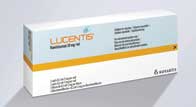Lucentis is now licensed and available for use in the UK but nearly 20,000 people will go blind before the drug is assessed by NICE say its supporters.
Rigorous clinical trials over the past two years have demonstrated that Lucentis (ranibizumab) can significantly improve visual acuity in up to 40 per cent of patients with wet age-related macular degeneration.
visual acuity in up to 40 per cent of patients with wet age-related macular degeneration.
Around 26,000 people develop wet AMD every year in the UK and this equates to over 500 people every week.
However, the National Institute for Health and Clinical Excellence is expected to spend another nine months reviewing Anti-VEGF treatments such as Macugen and Lucentis, during which time around 60 patients a day who could benefit from Lucentis may be denied this treatment on the NHS.
Register now to continue reading
Thank you for visiting Optician Online. Register now to access up to 10 news and opinion articles a month.
Register
Already have an account? Sign in here
